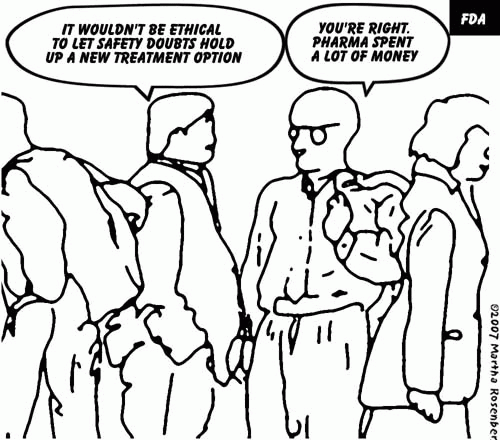"Trust me" used to be the punch line about how a certain obscenity is uttered by Hollywood agents.
It also used to govern the conflicts of interest policies at hospitals, universities, medical schools and scientific journals about doctors' and researchers' financial links.
But conflicts of interest (COI) at Harvard and other universities, medical journals, professional groups and at the FDA itself have ushered in a kind of disclosure fever. In addition to the Physician Payment Sunshine Act which requires drug and device makers to report physician payments yearly, medical schools are starting to reject industry money that traditionally funded Continuing Medical Education (CMEs).
Individual doctors' COIs have also been a problem for medical groups and journals.
The American Psychiatric Association, in its 240 page guide to its May annual meeting, "forgot" to mention the conflicts of interest of its own president Alan Schatzberg, MD. It had to print them on the newsletter circulated the third day of the meeting. Nor were names even alphabetized for easy information retrieval. (Schatzberg is financially linked to Eli Lilly, GSK, Merck, Pfizer, Forest, Takeda, Sanofi-Aventis and eight other companies.)
Joan Luby, MD, a pediatric depression expert says in the Archives of General Psychiatry in March she didn't disclosure lectures she gave for AstraZeneca and other pharma ties "because theywere not relevant to the subject of the article." Maybe that's why the New York Times magazine didn't disclose Luby's links in the August "Can Preschoolders be Depressed?" and five Wyeth links in April's "The Estrogen Dilemma."
And statin investigator, Harvard's Paul Ridker, MD, apologized to JAMA readers in 2006 for an incomplete financial disclosure for an article about cardiovascular clinical trials. He thought he only had to report funding for the "study at hand" and had omitted mentioning funding from AstraZeneca, Bayer, Novartis, Roche, Sanofi-Aventis and five other pharmaceutical companies.
(Note: You can view every article as one long page if you sign up as an Advocate Member, or higher).






